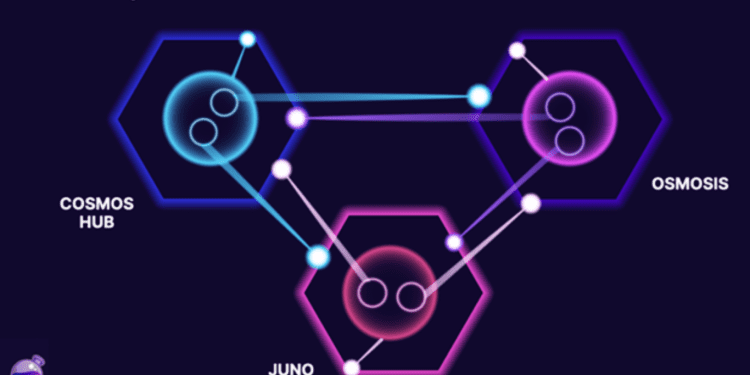Several Cosmos DApps and projects, including Osmosis, Axelar, and Akash, have announced a partnership to fund the development of a collaborative mesh security framework to be implemented across the Cosmos ecosystem. Osmosis is the leading Cosmos DEX, Axelar Virtual Machine is a programmable cross-chain communication protocol, and the Akash Network is a decentralized marketplace for purchasing computing resources, cloud services, and data.
Mesh Security Explained
Mesh security is designed to enhance the safety and resilience of a blockchain by distributing security responsibilities across multiple network participants rather than relying on a central authority or a single point of failure. This initiative aims to enhance the security of Cosmos chains while maintaining their independence.
In a mesh security system, nodes establish direct communication links with multiple other nodes, forming a mesh-like structure. This allows for the dissemination of information and the sharing of security responsibilities in a decentralized manner. Some of the main benefits of mesh security include:
- Peer-to-Peer Communication: Nodes in the mesh network communicate directly, creating a resilient network structure.
- ● Redundancy and Resilience: Multiple connections ensure network redundancy, allowing the network to continue functioning even if some nodes fail or are compromised.
- Distributed Consensus: Mesh security incorporates distributed consensus algorithms, requiring agreement from multiple nodes for transaction and block validity.
- Attack Resistance: Mesh security makes it difficult for attackers to disrupt the network, as compromising multiple nodes is necessary. It also prevents specific attacks like partitioning attacks.
- Privacy and Anonymity: Mesh networks offer enhanced privacy and anonymity by enabling direct communication between nodes without reliance on a central authority.
How Mesh Security Differs From Interchain Security
Mesh security differs from the current Cosmos Interchain Security (ICS) protocol through multi-lateral security, which enables chains to combine their market caps to enhance security, unlike ICS, where a single parent chain ensures security.
Mesh security doesn’t require validators to run additional nodes or share validators across chains. Instead, delegators can stake their tokens with validators of their choice on partner chains. If a validator behaves maliciously, both chains will slash their tokens. Delegators receive staking rewards from the partner chain based on their power.
Even though ICS caters to early-stage projects that prefer to rely on the Cosmos Hub’s validators, as ICS chains mature, they can transition to mesh security while still being partially or majority secured by the Cosmos Hub.
The Benefits that a Mesh Framework will bring to Cosmos
Mesh security is ideal for an Inter-Blockchain Communication (IBC) protocol like Cosmos as it consists of established app chains with their stakeholders and significant market caps. The benefits of Mesh Security for the Cosmos ecosystem include increased economic security, lightweight security provision, and utility chains with shared security.
A mesh framework aligns security relationships with economic relationships among Cosmos chains, reducing risks associated with economic interdependence. In addition, it enables established chains to support the launch of new chains and facilitates the collective sharing of certain services.
The development of mesh security will occur in three phases, each spanning around three months. Multiple organizations across the Cosmos ecosystem contribute to its development, with funding from Cosmos projects and project management led by the Osmosis Grant Program.
The development effort encompasses architecture, back-end development, front-end design, and additional tooling. The Cosmos ecosystem aims to enhance security and interchain cooperation by implementing Mesh Security, leading to more substantial and sovereign chains.














